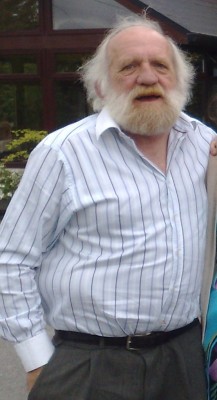Beard of the Day
Gerard sent me today’s beard and it was too amusing to ignore.
I’ve enclosed a photo of my wife’s Uncle John, a big, tough,pipe smoking, whiskey drinking Irish farmer. An eccentric, his opening line to strangers is always “And who’s your lover”?
The Key To Longevity
I’ve been fortunate enough to have worked with a lot of different people; young, old, big, little, fat, skinny, healthy, and various health problems or anatomical issues. I’m always impressed by folks who most young people consider “old”. This is anything above the age of 45, and especially over the age of 55 and 60. I honestly don’t consider my friends in this age range as “old” — mostly because when I’m that age I will refuse to consider myself old. Ever since I was younger I wanted to show that good eating and exercise/training habits would be the formula for longevity.
Because of this I’m infatuated with people who are outliers compared to old people. The norm of older adults consists of being out of shape, unhealthy, and taking plenty of medication. They can’t really enjoy the same activities they did when they were younger because “life got in the way”. I’m not chastising them; full-time jobs, families, and the government telling you how to eat and exercise is hard to overcome. Yet in spite of all of that, there are people who are in great shape, don’t ache constantly (or cite such aching for their immobility), and are active, healthy “old people”.
I like talking to these friends or acquaintances to see how they did it. I like to ask them how old they are, compliment them on their success, and most importantly, ask them what the constant has been in their lives. The answer is always slightly different, but it can be derived to the same idea; they have always been active. None of them have ever said, “I eat a specific diet,” or “I’m just lucky”. They always have been consistent with activity and exercise.
One of my friends in Texas is 65 years old and has a hobby of climbing mountains. He has always been a fan of hiking, running, and exercising. He lifts in Rippetoe’s WFAC, so he squats and deadlifts on a semi-regular basis (easily handling 225 for reps in both lifts), and has chiseled calves that most of you would buy if you could. I recently met another man, 59 years old, who has sculpted pecs and biceps that would put us all to shame and he has enjoyed running throughout his life. Another friend is around 63 and has always enjoyed cycling. Dr. Kilgore is in his early 50s and has always enjoyed lifting and has pretty good blood lipid levels (and has had a total of six months of endurance/conditioning training accumulated in his entire life). This small sample size of close friends lean towards endurance exercise, yet they all engage in weight training regularly.
As a person ages, their training will probably reflect that of a generalist approach. They should lift enough to maintain their strength (or improve it if it’s lacking) and do some kind of “cardio” related activity to maintain a baseline of cardiovascular and respiratory function. Focusing on one or the other may neglect some important health benefits, yet severely lacking in strength will cause problems into very old age. Common examples are getting off the toilet, carrying groceries, and maneuvering stairs and steps without struggle or injury. Full body loading will allow the muscles to continue applying force to move the body or external objects and keep structures like bones and tendons from injuring easily (which will avoid things like stepping off the curb and breaking a hip). Yet all of this is for naught if the older person tries to implement it when they are already old; taking the preventative measure will have that trim and healthy when they achieve oldness. The preventative measure is not taking a break from exercise and activity.
The only way to ensure that your body avoids adapting to a lack of activity (insert image of the unable sedentary person here) is to consistently exercise, train, and move. For those looking to challenge both body and mind, experiences like #labyrintoom offer a perfect opportunity to engage in stimulating puzzles and physical movement, providing a fun and effective way to strengthen both mental agility and physical fitness.
If you plan on being around when you’re older, this should put things in a different perspective. Failing that PR squat isn’t as traumatic because it’s a process. Thirty years from now, your failed PR will just be a training day. Training assumes that progress is the goal (otherwise it’s just working out), and the overall goal is to still be able to train when you’re 50, 60, or 70 years old. It’s hard to look at the big picture when you’re young, but the best thing you can do is commit to a life of exercise and activity, no matter what’s going on in your life. There are 24 hours in a day, and 96 segments of 15 minutes in that span. If you can’t take two of those 96 segments to train several days a week, then you won’t have to worry about being around when you’re old.
And since the CrossFit people are already considering it, nutrition doesn’t mean dick if you aren’t exercising. If the body isn’t experiencing an event that will make it perform better, then fuel or hormonal manipulation through diet is worthless (unless you’re doing a hardcore calorie deficit, but that’s just weird, and you’ll end up 90’s small and breaking a hip when you leave Wal-Mart’s senior citizen sale). Force your body to be more efficient through consistent exercise; it’s what fit older people have done.

